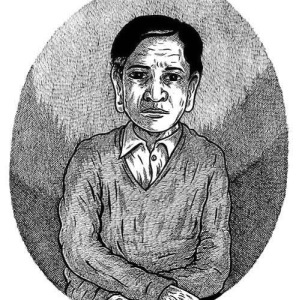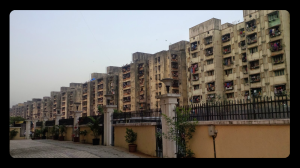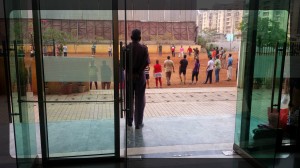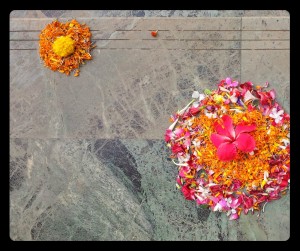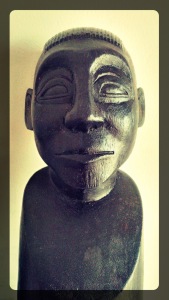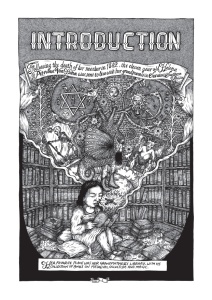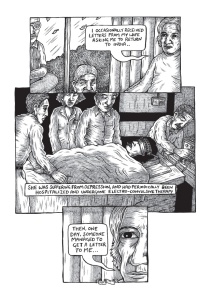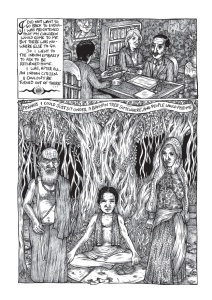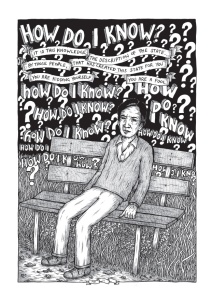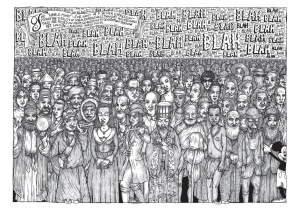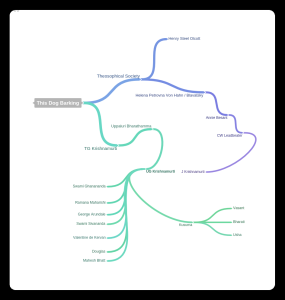“…for we can make no progress until we have completely put an end to this period.” – What is to be done? (Lenin, 1901)
Our perceptions are at all times defined, governed and even dictated by our environed histories of existence. The physical aspects and theoretical concepts never let go of their grip on and around us. Can there be a place where gravity is so powerful that your voice becomes denser and thoughts heavier? Reflect on this – thoughts becoming heavier; unable to spread out from their origins; sprouting outwards like ink in water at the time of birth, but then condensing and ultimately decaying at the very synapse where they flourished. Or, alternatively, a place where density is so sparse that thoughts leave as soon as they are born; they don’t need voices or words or letters to project them – like we do and often misinterpret them. Physiology affects thoughts which affect actions; in reverse, actions affect thoughts which affect physiology. Also, social existence affects thoughts which affect actions; in reverse, actions affect thoughts which affect social existence.
We are whatever we are not because we are whatever we are but because the social milieu accords us that whatever. We have been and are being raised to believe in our uniqueness and special abilities, conveniently ignoring that we are only doing, more or less, what already has been done and is being done since millions of years. Our talents, which we harbour inside us, wait for standing instructions to launch into an overt and kitsch display at the slightest hint of cajolery. Our pastimes and hobbies and knowledge, if at all, have stopped being something to be enjoyed privately and practised discretely; all of them have become an overt reflection of ours with the only purpose of overshadowing our intellectual shallowness. We work for a shining image of ours in the eyes of others and never for our own selves. Our paintings and art are not allowed to be mute pieces of craftsmanship but are forced to engage in lengthy vocal essays extolling the virtues and skills of their creator. Such masterful strokes of pen and elegant drops of brushes, they shout, can only be exercised by a man so possessed of high skills and gallivant imagination. He, they assert, is art unto himself. They have become blithe alter us. We do whatever we want to do not because we desire to do whatever we want to do, but only for our, not at all innate, desire to be known, recognized and admired. The diminishing appreciations force us to tread on newer so called paths, where again we want to be known, recognized and admired.

Can thought, knowledge and art exist in isolation? Can there be thought if there is no thinker? Can there be knowledge if there is no knower? And art without an audience? Can truth exist without falsity? A thought will cease to exist with the end of thinking ability of the thinker, even though the thinker may continue to exist; we call it a vegetative state. So a thought’s position is dependent by all means on the synaptic functions. But if that thought has been passed over to others, as words, letters or results due to actions taken, then that thought still exists somewhere out there. Knowledge, also, will terminate with the knower unless passed down in different forms. Art, of the kind of paintings, sculptures, scriptures and the likes, on the contrary, will continue to exist without an audience and with no desires at all of having one. Though, yes, it will not be appreciated as art and will not be called so but it will exist independently of all things and beings. Even when the thought behind the art has vanished, the art, once created, will continue to exist. Truth and falsity, on the contrary, cannot exist without each other – in fact the other, for each of them, is what makes them exist. The other, this is an important concept.
We are doing whatever we are doing, supra, only for others. The others are doing for those who are others to them. Everyone, all in all, is doing things for others. Are these others just an imagined community whose only purpose is to assess us on every count and spit praises and hurl approvals at us? It seems that is what we are doing because thought and knowledge exist only, when isolated, with the thinker and knower. And the thinker and knower, in every sense, want to spread their abstract possessions either as a gesture of magnanimity or because of servitude to leave a legacy. Our religious celebrations are loud enough to silence the muezzin, mute the priest and disarm the prophet. They are loud as a display of our passionate devotions and unbending faith, which together can turn molasses into gold and flesh into sacrifice. Happiness, can it of all, exist in isolation? Presently, comprising also of the years since emotions diverged as a fork in evolution, it seems that an ostentatious strutting of happiness in others’ faces is what makes us happy. We are not happy for its sake, but for the only reason that we could share it; that we could plough someone with our laughter, fulfilment, and contentment. Our righteousness is only so much of a display to appear righteous, when in fact in our dark innards we might as well be insultingly quite opposite. So it is these others who define us all, control us and prod us to be like them, when they themselves are at the end of the strings of others. As a mass, if you see, everyone is doing something new, something creative, intelligent and inspiring, but when you detail their doings it is nothing but shameful, forceless, and destructive imitation. Everyone is out there to achieve something, someone or everything, everyone. But to what end? And for what? They have all comfortably forgotten, ignored and in fact never pondered over the meaninglessness and purposelessness of this all. Their desires consuming them even after their death, their bodies covered in lamenting coffins or yellowed flowers to appear solemn, rich and powerful. Desires, take a short pause to think, are of two categories – ones which will come to us no matter what, and the ones which come to us because of what we see around us. The first ones can’t be denied and will rear their head sooner or later. The second ones can be suppressed, ignored and, even better, heeded with no action and thereby making us reach a higher state. Hence, to be completely free of desires, and be free from the desire to be free, only one route exists – the one which questions existence and the metaphors of being.

This sludge takes us into the hot waters of free will, that willy-nilly thing which has been portrayed as the cure of all shortcomings and antidote to all defeats. Go out and the universe is there for you to conquer. Where is the freedom in your will if you will do the same which has been done? Learn the same which has been learnt? And live the same which has been lived? Also, how creative, supra, is that what we are doing? How new and original is it? Are we disbanding our past and foraging for a disconnected future? Are we to, and can we, start from an absolute zero? Should we erase our memories for they are the most important representation of the past? Can we not refuse to learn when in the arms of our mothers and decline to mimic them in entirety? Can we make the past zilch and move towards a newer reality? Can we invent something new without learning what all has been yet invented? Can we develop a new language without being aware of what all languages and dialects already are being spoken? This we can’t because anything which we claim to be original will only be, at best, something which any other thing isn’t. The new always builds up on the old. The new is not so new after all. Continuity will never allow us to be free or original. Continuity all around us limits us, stalls our thinking and hinders the chant of a revolutionary new. Continuity is an anti-concept and pervades everywhere like ether. Our sorrows, pains, emotions, gains, longings, wants, and even thoughts and actions are grounded in as well as elongate continuity. Evolution is continuous, always selecting and rejecting from the harbinger of a dying race. We are afraid of having an orphaned past. But it is discontinuity only, and only discontinuity, which can melt the steel of our values, morals and beliefs. Our past has to be hacked off ourselves, however painful and tearing that might be; the rear view mirrors are to be smashed; straitjackets to be put on every neck that threatens to turn around; and any eye that looks into another for a reflection of the past is to be blinded, gouged and crushed.

At the outset, however, we have to accept that the present has no value whatsoever. The present is just a momentary gauze through which the future passes to become history. The future, yes the whole of it, is eager and desperate to become something which has been experienced and is written about. It, just like us, desires to be talked about, given importance and remembered in melancholic tales. And it is this past which gives us meaning, purpose and direction. But more than that, it has dishelmed us, leaving us vulnerable to repeating all that has been done; its rabid wolves are at the gates. The needling past bites us in our behinds while we continue trudging in dire straits as if the past will never outpace us. And precisely it is this because of which a discontinuous future is what will burn our endless justifications into a pile of nonsense, crush our fear of a downfall in the minds of others, and disrobe us of all our misgivings and pretensions. Henceforth, treat the present as an atoning gift to the unforeseen and unimagined future.

Life after all is what but four symbols – the asterisk, the comma, the semi-colon, and the full-stop. It begins with excitement and brouhaha, interjects at times only to resume with zealousness, realizes the lack of meaning in all, and gets concluded by nothing but the end. And what anyways is so virtuous in being born? And in the least of being a human? Humanity? Ah, that lame of an invisible thread which binds us towards betterment of fellow human beings. Humanity needs to be chained – like this: “humanity”. It deserves to be punched, kicked and mauled because it has taken too much of liberty in the name of itself. It divides, categorizes and objectifies. Nouns, excluding the great humans, never differentiate between us and the others. The heat, the cold, the disease, the death – all treat us the same and this is when, when humans disappear, that we and the others become the same. Ironic that equality is bestowed upon us only through nouns from which we have to be first excluded. Still, however, equality for what result? Equality in money, love, peace, justice, education, life and death – but with no clear objective in mind we run after these terms only to be treated equal but still unclear within ourselves as to what is to be done after gaining equality. And this is why a discontinuous past has to be installed as a garrison of hope. Its impending victory will be met with a thunderous applause not when victorious but when resting on its death bed, for very few will realize what relieving deliverance has been heaped upon them.

It is maddening, saddening, and burgeoning to be in the present state. We continue to be plagued by bubonic sadness and yet sow seeds of misery in our minefields of helplessness. Logic would dictate that during a crest of happiness existence should cease for we would never ever know if there could be a wave in the future higher than that. But illogic prevails and we wait for higher crests, but all we get in return are troughs and trenches of barren depravity. Our senses, the so called five of them, enable us to interpret; but also deprive us of truth because it is only through them that we see, smell, speak of, hear and touch the world and derive our experiences. We are nothing but slaves of these senses. Our thoughts, of which we are infinitely proud, grow as branches on trunks of experience which grow out of roots of learning, which implies continuity. The trunk has to be sawed off the roots and taken to a different realm. Falsified nourishment poured at their roots is the cause of the branches being weak, symptomatic of a malign which hides in the reasoning that if dispossessed of the vital elements they will nothing but die. Die and wither they must if they are incapable of absorbing the revolutionary new; but how long will they keep dying? A time apt enough will come someday when anger and dejection from being pilloried ceaselessly will resurrect these very pliable branches of thoughts and make them armour of a revolutionary new and support the trunks and fresh roots. The branches ought to stop feeding on the trunks and roots, but feed them instead. This then will be a new beginning. But for that, one must, now, think.
What, if at all, is to be done?


